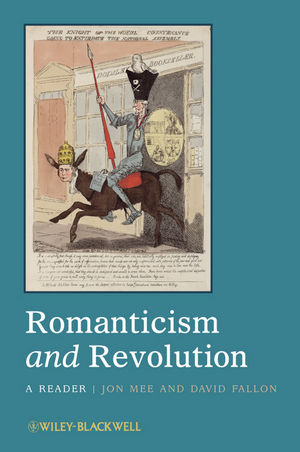Romanticism and Revolution: A ReaderISBN: 978-1-4443-3044-1
Paperback
216 pages
February 2011, Wiley-Blackwell
 Other Available Formats: Hardcover
|
||||||
—Sharon Ruston, University of Salford
"John Mee and David Fallon's Romanticism and Revolution: A
Reader is destined to become the first choice for those seeking
to analyze the most important context for the emergence of English
Romanticism. This work—given the care of its preparation, the
concision of its informative introductions, and the greater depth
of its entries—will delight students and teachers frustrated
by past anthologies and should supplant past anthologies in
classrooms at every level of instruction."
—Mark Lussier, Arizona State University
"Romanticism and Revolution offers a representative
anthology of immediate British reactions to the epoch-making events
taking place in late eighteenth-century France. Reflections on the
Revolution meant debate over the Rights of Man - and Woman - as
well as on the nature of Government, patriotism, social and
political justice. This careful selection of passages from the most
important texts allows modern readers to see the intense
contemporary debate unfold, to consider the arguments and to trace
the dialogues between different writers. Key players in the great
Revolutionary Debate come alive for a modern readership through
these memorable passages of highly distinctive prose and are set in
context by the other extracts as well as through judicious
editorial introductions and notes. Anyone keen to develop a real
understanding of the political climate of the early 1790s will find
this volume indispensable."
—Fiona Stafford, Somerville College, University of
Oxford
"An indispensable volume – in every way a worthy successor
to Marilyn Butler's Burke, Paine, Godwin and the Revolution
Controversy. In Romanticism and Revolution, Mee and
Fallon provide intelligent, representative, wide-ranging selections
from Price, Burke, Wollstonecraft, Paine, and Godwin for a new
generation of students and scholars. Due not least to the
generosity of their selections, Mee and Fallon revitalize our
understanding of – to name but a few contexts – Price's
politics of Rational Dissent, Burke's affective rhetoric of the
sentiments, both Wollstonecraft's attack on Burkean theatricality
and her arguments for female education, Paine's levelling of
political language, and Godwin's ideals of political utility and
disinterestedness. As Mee and Fallon note, the Revolution
controversy was a political battle fought with literary weapons:
Romanticism and Revolution illuminates this vital
affiliation throughout, emphasizing as it does the indissoluble
links between the rhetoric of political argument and the politics
of literary forms and strategies. Romanticism and Revolution
forcefully reminds us of the centrality of the Revolution
controversy both for the writers of the 1790s, writing as they were
under the pressure of events at home and abroad, and for critics of
Romanticism ever since, trying to make sense of the incontestable
though often unwieldy connections between Romanticism and
Revolution. It is essential reading for anyone interested in the
heady mix of politics and literature that continues to constitute
Romanticism."
—Charles W Mahoney, University of Connecticut



